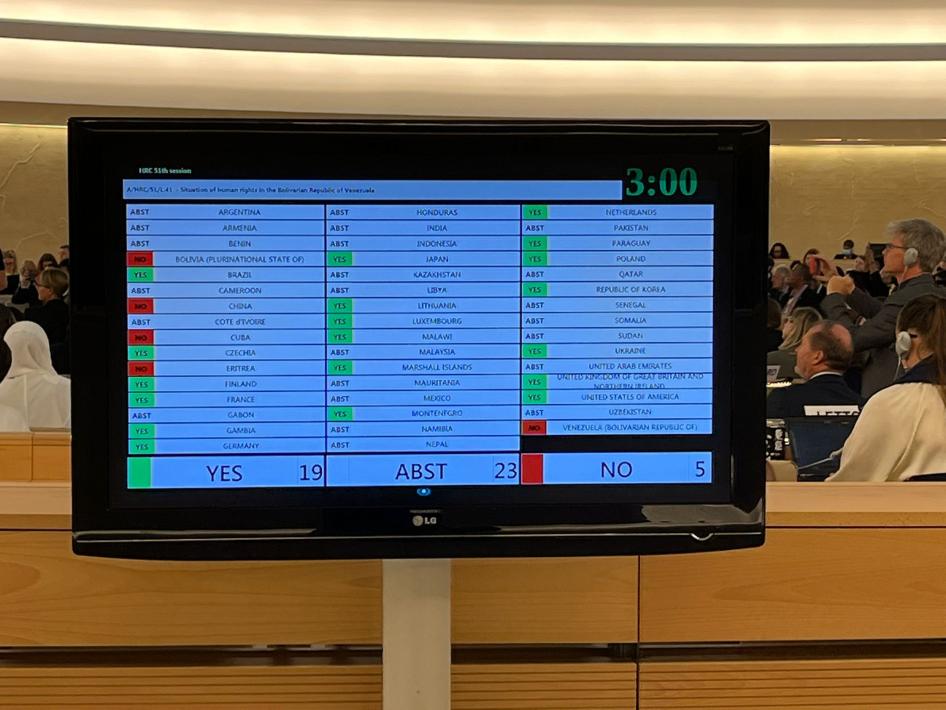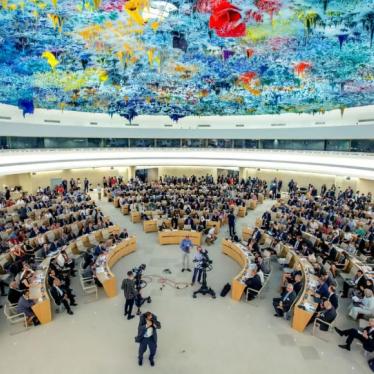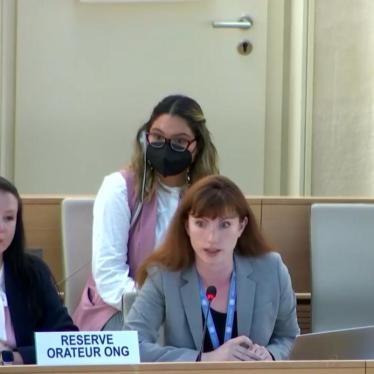(Geneva) – The United Nations Human Rights Council has taken a crucial step to push for accountability for serious crimes and ensure international scrutiny of Venezuela’s human rights crisis, Human Rights Watch said today.
On October 7, 2022, the Human Rights Council adopted a resolution to extend the mandate of the Independent International Fact-Finding Mission on Venezuela (FFM) for two years. The FFM has published four damning reports documenting evidence of crimes against humanity, judicial complicity, chain of command responsibility including abuses by intelligence services, and human rights violations in mining areas. The resolution also extends the mandate for the Office of the High Commissioner for Human Rights, which has a presence in Caracas, to monitor the in-country situation for the same period.
“This resolution shows that Latin American governments can stand together with victims of abuse regardless of governments’ political ideologies,” said Tamara Taraciuk Broner, deputy Americas director at Human Rights Watch. “The Fact-Finding Mission’s extension is extremely important, not only to support victims’ quest for justice, but also to play an early warning role in the lead up to the 2024 presidential elections.”
The resolution was presented by countries in the region from across the ideological spectrum, including Brazil, Canada, Chile, Ecuador, Guatemala, and Paraguay. It was co-sponsored by nearly 50 countries and approved by a vote of 19 to 5, with 23 abstentions.
The Human Rights Council resolution acknowledges that human rights abuses are ongoing and expresses concern for issues that, “continue to undermine the independence of the justice system, contribute to impunity and the persistence of human rights violations and abuses, have an impact on access to justice for victims and hinder the holding of free and fair elections.” It requires the mission to present oral updates and written reports during the extension.
The Mission was established in 2019 to investigate, “extrajudicial killings, enforced disappearances, arbitrary detentions and torture and other cruel, inhuman or degrading treatment since 2014.” The resolution to create the mandate was presented by a coalition of governments called the Lima Group – countries from the region including Argentina, Brazil, Canada, Chile, Colombia, Guatemala, Guyana, Honduras, Paraguay, and Peru.
This time, Argentina, Colombia, Guyana, Honduras, and Peru did not join the core group on the apparent false premise that doing so would undermine attempts to engage with Venezuelan authorities. Peru was initially a core group member but withdrew its support on September 28.
Engagement with Venezuela should not be seen as an impediment to condemning human rights violations, Human Rights Watch said.
The Venezuela government’s crackdown on dissent continues, without justice for victims. The Venezuelan organization Foro Penal counted 244 political prisoners as of September, many in detention centers such as Helicoide, which is administered by intelligence services. Detainees have faced torture, including electric shocks, waterboarding, and sexual violence. Security forces killed at least 19,000 people between 2016 and 2019. Many killings were recorded as resulting from “resistance to authority,” but evidence showed many were extrajudicial killings.
Since 2020, the Mission found sufficient grounds to believe crimes against humanity had been committed and in 2021, that the justice system had served as a mechanism of repression, instead of a guarantor of rights.
Most recently, on September 20, the Mission published a report describing how crimes against humanity committed by intelligence services, with orders from high-level authorities including Nicolás Maduro, were part of a plan to repress government opponents. A second report referred to abuses by security forces and armed criminal groups against residents and workers in mining areas.
For years, organizations and families of the victims have reported that security forces were involved in the government’s crackdown on dissent. The Mission’s reports are crucial to victims’ fight for justice.
In August, Human Rights Watch, together with 124 national and international organizations working on Venezuela, advocated renewing the mandate, given the lack of judicial independence in Venezuela. The extension will allow experts to continue gathering evidence of human rights violations, report on current dynamics in the country, and provide recommendations for action.
The mission’s role complements other international scrutiny mechanisms working on Venezuela, Human Rights Watch said. The evidence the Mission collects could support the investigation by the Office of the Prosecutor of the International Criminal Court (ICC), which was opened in November 2021 with a view toward establishing individual criminal responsibility for egregious crimes. While the ICC investigation could take years, and is currently suspended due to the Venezuelan authorities’ request for deferral, the mission reports annually on rights violations and individual criminal responsibility for alleged crimes against humanity.
The resolution also asks the Office of the United Nations High Commissioner for Human Rights to provide a detailed assessment of the how well its previous recommendations have been carried out. The office has had a team in Venezuela since 2019 and has released several reports exposing human rights violations. It also provides technical assistance to Venezuelan authorities.
The team should take advantage of its presence on the ground to get information and engage daily with victims and civil society organizations. Unfortunately, the office no longer has access to detention centers where political prisoners are being held.
In August 2021, government and opposition representatives held meetings in Mexico to negotiate issues including electoral guarantees, the lifting of sanctions, respect for the rule of law, humanitarian aid, and political rights. The Maduro government withdrew from the negotiations in October 2021, and despite ongoing conversations to increase humanitarian aid reaching the Venezuelan people, the negotiations have not fully resumed.
“Venezuelan authorities have failed to make concessions voluntarily to protect the rights of Venezuelans, and there is no reason to think that will change,” Taraciuk Broner said. “No negotiated solution to transition back to democracy is possible without incentives, and international pressure and accountability are essential to create them.”









